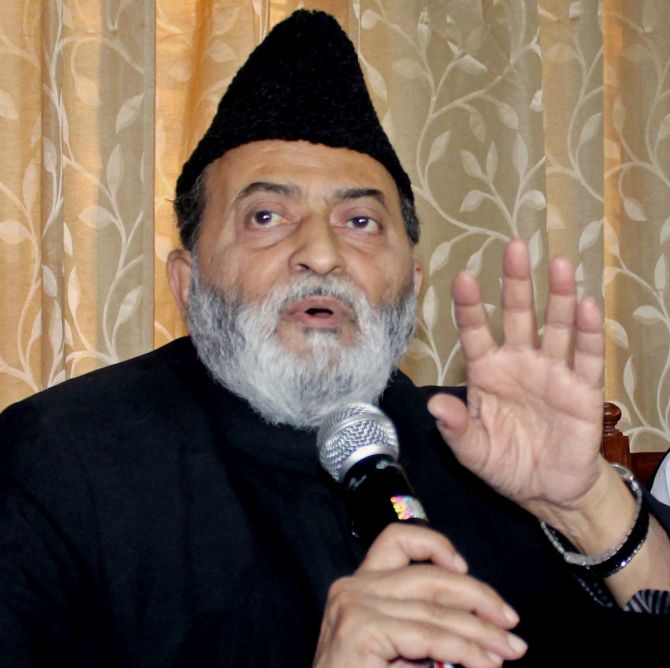The man who fought for Babri Masjid in court is no more

Senior advocate Zafaryab Jilani passes away
Ubair Ul Hameed
Zafaryab Jilani, the renowned advocate who played a pivotal role in the historic Ram Janmabhoomi-Babri Masjid case, passed away in Lucknow on Wednesday. The 73-year-old was battling medical complications after he suffered a brain hemorrhage two years ago.
Jilani's rise to prominence can be traced back to the mid-1980s, a time when a significant event was brewing, casting a shadow over communal harmony. It was during this tumultuous period that the unlocking of the Babri Masjid in 1986 set off a chain of events that would forever alter the socio-political landscape of the nation. Jilani spearheaded the formation of the Babri Masjid Action Committee, assuming the key role of convener.
In the aftermath of the demolition of the Babri Masjid in 1992, Jilani emerged as an influential, powerful voice of the Muslim community, becoming the advocate for the All India Muslim Personal Law Board. With determination, he pursued their claim to the disputed site, treading the path of negotiations and seeking a peaceful resolution.
Beyond his role as an advocate, Zafaryab Jilani embodied the essence of the Babri Masjid cause. His conviction resonated within the halls of the courtroom as he argued on behalf of the Uttar Pradesh Sunni Waqf Board, passionately declaring, “Once a mosque, always a mosque.”
Born and raised in Malihabad in Lucknow district, Jilani had humble beginnings. The era of Partition cast its shadow over his family, prompting his father, Abdul Qayoom Jilani, an employee of the Indian Postal Services, to make the difficult decision to resign and migrate to Pakistan. However, when he visited India in 1948 for his marriage, he had a change of heart and decided to stay back.
The family shifted to the state capital Lucknow where Jilani and his four brothers found solace and new beginnings.
Jilani’s academic journey took him to Aligarh Muslim University (AMU), where he honed his legal acumen, joining the ranks of its esteemed alumni. Armed with LLB and LLM degrees, he embarked on a legal career in Lucknow under the tutelage of the renowned civil lawyer Shafiqur Rehman. Practising in the Lucknow bench of the Allahabad High Court, Jilani passionately pursued justice in the courtroom, even as he taught law part-time at the city’s Shia Degree College.
Jilani also served as Uttar Pradesh's Additional Advocate General during the last tenure of the Samajwadi Party government.
In the wake of the Supreme Court's verdict in the Ram Janmabhoomi case in 2019, Jilani expressed his discontentment, voicing concerns regarding the impact on the Constitution and secularism. “The judgment has just been pronounced, it says a lot of things about the Constitution and about secularism. We are very dissatisfied with this judgment. Article 142 does not let you do this," he had said in 2019.
“I am now a man at peace. Whatever might the judgment have been, as an advocate, for me it is no more of legal manoeuvrings and court dates," he had told reporters.
Jilani’s funeral prayer, the Namaz-e-Janaza, was offered in a solemn ceremony at Darul Uloom Nadwatul Ulama in Lucknow. He leaves behind a legacy carried forward by his two sons and daughter. His eldest son, Najam, following in his father's footsteps, is a law practitioner in Lucknow.
The news of Jilani's passing reverberated far and wide, evoking heartfelt tributes from several senior lawyers, political leaders and organizations across the nation.
M.R. Shamshad, the lawyer-on-record from the Supreme Court who worked with Jilani in the Babri litigation, called him “a great human being, lawyer with integrity and Commitment” in a tribute he wrote to him in The Indian Express.
“He was a true community leader, who ignored his personal interest and put his entire life in contesting and defending the issues of the Muslims. In my view, the community at large shall remain indebted to his services, which have no parallel,” Shamshad wrote.
The All India Muslim Personal Law Board, of which he was secretary, acknowledged his contributions. “Jilani was an experienced lawyer and had great sympathy towards the Muslim community. He had contributed a lot under the banner of All Indian Muslim Personal Law Board,” the AIMPLB said in a tweet.
Asaduddin Owaisi, the AIMIM chief, referred to Jilani as a “mentor” in a video he shared on Twitter. He described Jilani's demise as a “blow” to the oppressed and marginalized, particularly the Muslim community, emphasizing his efforts in the legal battle for the Babri Masjid.
“He dedicated his life to justice and equality for the oppressed,” Owaisi said.
Ubair Ul Hameed is a fellow with TCN-SEED mentorship programme
